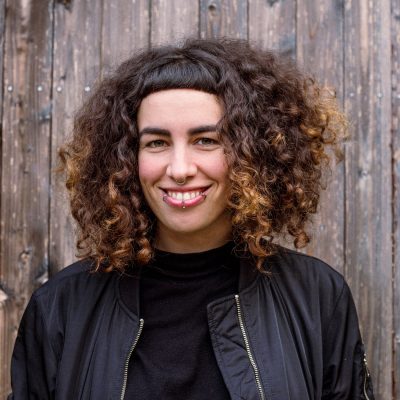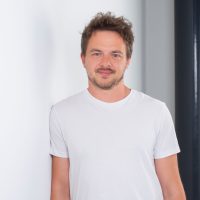Within the framework of “The New New” fellowship, 24 thought leaders in twelve projects from across Europe spent six months working on visions of inclusive digital futures. The fellows have provided very concrete opportunities and pathways with a wide range of content, formats and media that empower people in our digital world.
AI-based voice services which, unlike Amazon Alexa, Cortana and Siri, do not reinforce stereotypes. A digital platform that provides support to victims of domestic violence. A critical-thinking card game designed to get players to question the absurdities of technology. A collaborative online portal that improves the data on poorly documented medical conditions among underrepresented groups. These are just a few examples of the twelve projects that were funded for six months as part of “The New New” fellowship.
Large interest in a place to explore visions for our digital futures
Following intensive preparation, our Ethics of Algorithms project, together with the non-profit Superrr Lab, issued a call for applications for the first “The New New” fellowship at the end of 2020. The fellowship serves as a vehicle to explore potential answers to the following questions:
- What kind of world do we want to live in?
- What role should digital innovations play in this world?
- How can we ensure that algorithms, artificial intelligence and other technologies foster inclusion, diversity and cohesion?
By January 6, 2021, the application deadline, we had received almost 300 applications from across Europe. Vastly exceeding our expectations, this response clearly showed that there are many ideas of how to strengthen human-centered digital transformation in Europe.
Choosing from more than 300 fellowship applications, “The New New” advisory board selected twelve projects from nine countries. In addition to six months of financial support, each project was provided coaching support tailored to their specific needs and was able to participate in regular networking events with the other fellows. Fellows were thus provided the professional development tools they need to intensify their activities and inspire impulses for more just and inclusive digital futures.
A diversity of perspectives reveals alternatives to the status quo
The fellowship began with input from the fellows on their wants and needs regarding the program’s design. In addition to monthly networking meet-ups among the fellows, the program conducted three public workshops on the following issues, which were determined by the fellows: “Safe(r) and Brave Spaces,” “Decoloniality“ and “Thinking of Futures.”
Several interviews have also been published on the project’s dedicated “The New New” blog. In the interviews, the fellows discuss the plans for their projects, the motivation behind establishing their projects, and their values with regard to digitalization.
Propositions for better digital futures
What are the digital futures we can imagine? The answer to this question depends largely on whom the public pays attention to – and who is ignored. Can new perspectives enter public debates and draw our attention toward things that are frequently overlooked?
These questions framed “The New New” online event on October 7, 2021, which marked the conclusion of the first round of fellowships. The closing event featured contributions from several fellows and those of other experts, voicing their propositions for better digital futures in the form of three-minute presentations.
Coming from a variety of different perspectives, the contributions highlighted the blind spots within our digital discourses in society, which range from the lack of awareness about algorithmic decision-making in social contexts to issues regarding access to digital infrastructure. The contributions thus brought into focus those perspectives that otherwise receive little or no attention. In addition to highlighting injustices, participants’ contributions outlined the different ways in which our digital futures can be developed more equitably.
A recording of the 10 Propositions for Claiming Better Futures online event is available here:
A visionary magazine: Correspondences from the Edges
The closing event also included a look behind the scenes of the Correspondences from the Edges magazine, which was launched within the context of the fellowship. The magazine contains contributions from both “The New New” fellows as well as other experts. For example, Kate Crawford, a leading scholar on the social and political consequences of AI, points out the limits of the use of AI and emphasizes its political dimension. Author and journalist Tinashe Mushakavanhu presents Reading Zimbabwe, a digital platform that serves as an archive for Zimbabwean literature, showing how strongly the internet and its infrastructure are influenced by the English language.
Several other contributions deal with power structures in our digital world and explore the question of who actually determines our futures. From a variety of perspectives, the authors provide ideas on how to create more inclusive digital future spaces. Lending expression to a wide range of voices, this unique magazine is a worthy read.
Thanks to all “The New New” fellows
Over the last few months, the fellows have shared their experiences, narratives and ideas through their projects. They have impressively demonstrated the wide range of contents, formats and media that can be used to make our digital futures more inclusive. For the fellows, “The New New” fellowship served to fuel their drive and professional development. As they continue to work on their projects, we will continue to follow their doings with interest.
The New New is an initiative by the Bertelsmann Stiftung’s Ethics of Algorithms project and the nonprofit Superrr Lab. The program also receives support from the Allianz Kulturstiftung and the Goethe-Institut.
This text is licensed under a Creative Commons Attribution 4.0 International License




Write a comment